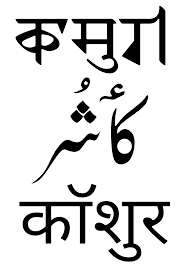Language/Kashmiri/Grammar/Plurals
Hi Kashmiri learners! 😊
In this lesson, we will focus on the plural form of nouns in Kashmiri. We will learn how to form plurals and understand the rules that govern this aspect of Kashmiri grammar. By the end of this lesson, you will be able to form plurals with ease and improve your overall fluency in Kashmiri.
Introduction[edit | edit source]
In Kashmiri, as in most languages, the plural form of a noun refers to more than one thing. In English, the plural form is usually formed by adding "s" or "es" to the end of the noun. However, in Kashmiri, there are certain rules that govern how plurals are formed.
In this lesson, we will learn how to form plurals in Kashmiri. We will cover both regular and irregular plural forms. We will also discuss the cultural significance of plurals in Kashmiri and how it reflects the history and traditions of its people.
Take some time to dive into these other pages after completing this lesson: Pronouns, How to Use "Have", Conditional Mood & How to Use Be.
Regular Plurals[edit | edit source]
The regular plural form is used when there is a straightforward way to form the plural of a noun. In Kashmiri, to form a regular plural, you simply add the suffix "wun" to the singular form of the noun. Here are some examples:
| Kashmiri | Pronunciation | English |
|---|---|---|
| ལེན་མ་ (lenma) | /len.ma/ | boy |
| ལེན་མ་ར་ (lenmar) | /len.ma.ra/ | boys |
| ཤིང་ (shing) | /ʃiŋ/ | girl |
| ཤིང་བ་ (shingba) | /ʃiŋ.ba/ | girls |
Note that the suffix "wun" is added to the end of the noun, but it replaces the final vowel of the root word. Another point to bear in mind is that not all nouns end in a vowel. Those nouns that end in a consonant can add a short "a" sound between the consonant and the plural suffix "wun". Here are some examples:
| Kashmiri | Pronunciation | English |
|---|---|---|
| རྗེ་ (jhe) | /dʒhe/ | tree |
| རྗེ་ར་ (jher) | /dʒhe.ra/ | trees |
| རིང་ (ring) | /riŋ/ | house |
| རིང་ར་ (ringar) | /riŋ.ga.ra/ | houses |
Irregular Plurals[edit | edit source]
There are several irregular plural forms in Kashmiri that do not follow the regular rules of adding a plural suffix to the end of the noun. These are formed in different ways, depending on the root of the word. Here are some examples:
| Kashmiri | Pronunciation | English |
|---|---|---|
| ལོ་ (lo) | /lo/ | person |
| མི་ (mi) | /mi/ | woman |
| དངོས་ (dangos) | /daŋ.os/ | child |
| ཉན་ (nyan) | /ɲan/ | eye |
Note that some nouns change completely in the plural form, while others change partially. For example, the plural form of "ལོ་" (lo) is "ལོར་" (lor), which has a completely different root word.
Cultural Significance[edit | edit source]
In Kashmiri, plurals play an important role in reflecting the culture of its people. The existence of different plural forms for different nouns shows the diversity and complexity of the language. Plurals can also reveal information about the history and traditions of the Kashmiri people.
Dialogue[edit | edit source]
Here is a dialogue to demonstrate the use of plurals:
- Person 1: རྒྱུད་གསུམ་པོ་ལུགས་པ་བཞིན་དུ་ (Gyusumpolug paw shzin-du?) (How many students do you have?)
- Person 2: སློབ་པ་ར་ (Lopar) (Four)
Conclusion[edit | edit source]
In Kashmiri, forming plurals is an important aspect of the language. By understanding the rules of forming plurals, you can improve your understanding of the language and increase your fluency. Remember that finding native speakers and practicing with them is the best way to learn any language. Don't hesitate to ask questions if you have any doubts.
➡ If you have any questions, please ask them in the comments section below.
➡ Feel free to edit this wiki page if you think it can be improved. 😎
Sources[edit | edit source]
Finished this lesson? Check out these related lessons: Alphabet and Pronunciation, Say Hello and Greetings in Kashmiri, Gender & Adjectives.
Videos[edit | edit source]
K 23,kashmiri language,singulars,plurals of birds,with syed haamid ...[edit | edit source]
Other Lessons[edit | edit source]

